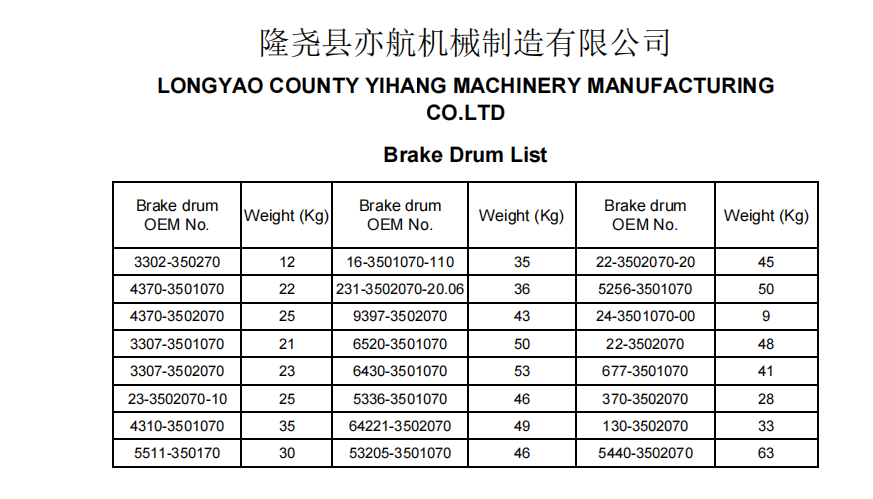nov . 13, 2024 18:23 Back to list
brake drum vs rotor
Brake Drum vs. Rotor Understanding the Differences
When it comes to automotive braking systems, two common components come into play brake drums and brake rotors. Understanding their differences is essential for both vehicle owners and mechanics alike, as it can impact vehicle performance, safety, and maintenance costs. This article explores the characteristics and functionalities of brake drums and rotors, highlighting their advantages and disadvantages to help you make informed decisions regarding vehicle braking systems.
What are Brake Drums?
Brake drums are components found in drum brake systems, which were more prevalent in older vehicles but still commonly used in some modern models, particularly in the rear braking systems of trucks and certain SUVs. A brake drum is a cylindrical component mounted on the wheel hub, and it houses the brake shoes. When the brake pedal is pressed, hydraulic force pushes the brake shoes outward, causing them to press against the inner surface of the rotating drum. This contact generates friction, which slows down the wheel's rotation, ultimately bringing the vehicle to a stop.
Advantages of Brake Drums
One primary advantage of brake drums is their effective heat dissipation, which can be beneficial in heavy-duty applications. They tend to perform well under high loads, making them suitable for vehicles that frequently carry heavy loads or tow trailers. Drum brakes also have a self-energizing effect; as the shoes press against the drum, they are pushed further against it by the rotation of the drum, enhancing braking force.
Moreover, brake drums tend to be more cost-effective than disc rotors. They are generally simpler in design, which can lead to lower manufacturing and replacement costs. Additionally, drum brakes often have a longer lifespan if maintained properly, making them appealing for budget-conscious consumers.
Disadvantages of Brake Drums
Despite their advantages, brake drums have notable drawbacks. They are more prone to heat buildup, which can lead to brake fading—where the braking performance diminishes due to excessive heat. This is particularly evident during prolonged or aggressive braking situations, such as those encountered in mountainous areas or during frequent stop-and-go driving.
Additionally, brake drums can be heavier than disc rotors, which can affect vehicle performance and fuel efficiency. Since they are enclosed, drum brakes also collect dust and moisture more readily, potentially leading to corrosion and decreased performance over time.
brake drum vs rotor

What are Brake Rotors?
In contrast to brake drums, brake rotors are part of disc brake systems, which have gained popularity in modern vehicles due to their superior performance characteristics. A brake rotor is a flat, disc-shaped component that rotates with the wheel. When the brake pedal is pressed, brake calipers squeeze brake pads against the rotor, generating friction that slows down or stops the wheel's movement.
Advantages of Brake Rotors
Brake rotors offer several advantages over drums. One of the most significant is their superior heat management, which helps minimize brake fading. The open design allows for better air circulation, effectively cooling the components during use. Disc brakes also provide more consistent and reliable performance across a wider range of driving conditions.
Furthermore, brake rotors are generally easier to inspect and replace than drum brakes. The visibility of the rotor and caliper allows for simpler maintenance practices, which can contribute to overall vehicle safety.
Disadvantages of Brake Rotors
However, brake rotors are often more expensive than drum brakes, both in terms of parts and labor for installation. Their exposed design can also lead to quicker wear on the brake pads, necessitating more frequent replacements.
Conclusion
In summary, the choice between brake drums and rotors ultimately depends on the type of vehicle, driving conditions, and personal preferences. Brake drums may be advantageous for certain heavy-duty applications, while brake rotors offer superior performance and maintenance benefits in most modern vehicles. By understanding the key differences between these two braking systems, owners can make informed decisions that enhance the safety and efficiency of their vehicles.
-
Your Brake Drum Man: Quality & Performance Parts
NewsAug.21,2025
-
Explore Japan: Ultimate Travel Guide & Authentic Experiences
NewsAug.19,2025
-
Your Brake Drum Man: Premium & Reliable Brake Drums for Sale
NewsAug.18,2025
-
ROR Web Development: Build Fast, Scalable, Secure Apps
NewsAug.17,2025
-
Scania Brake Drums: OEM Quality for Optimal Safety & Durability
NewsAug.16,2025
-
R.V.I: Advanced Remote Visual Inspection for Precision
NewsAug.15,2025
